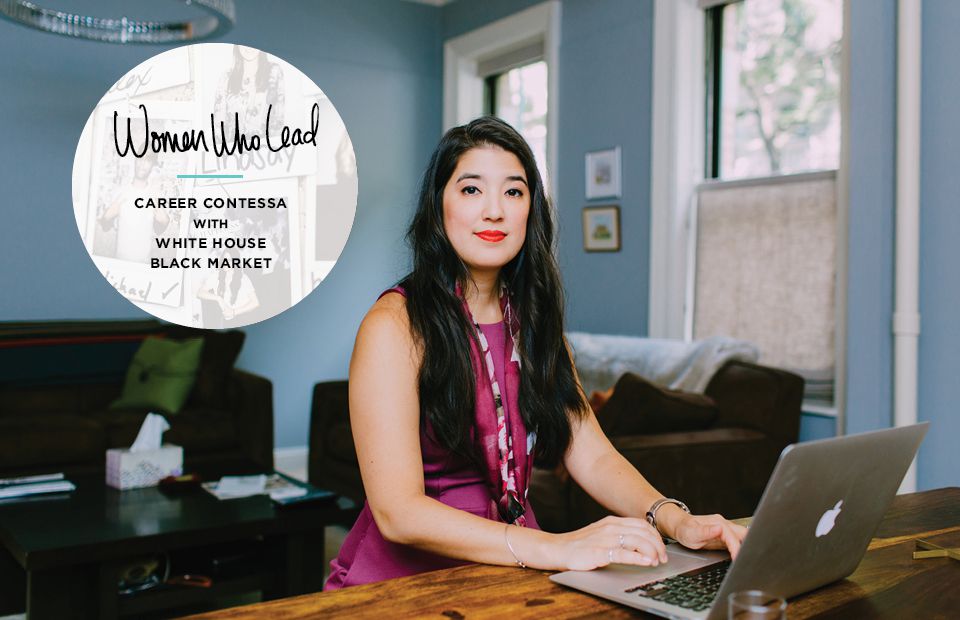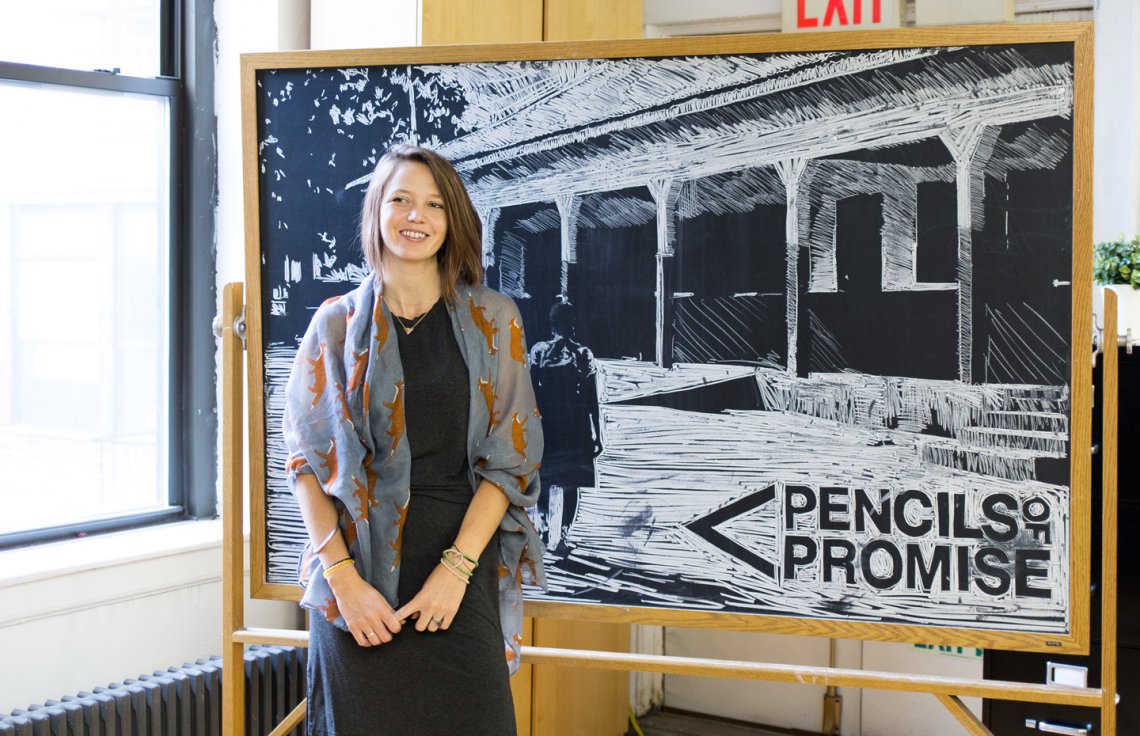Meg Evans, 26, is now one of a number of modern day gals who has successfully turned her passion into a career, and after sitting down with the Social Innovation Manager, it’s clear that she wholeheartedly believes that anyone else can do the same. All is takes is a little confidence and a whole lot of persistence.
Meg has set up shop at Udemy, a website that offers over 18,000 free and paid courses that anyone can take in order to learn new skills. She is in charge of coordinating efforts to help non-profits and improving and communicating the social impact Udemy has on the world. Meg initially uncovered her innate interest in education during high school, although she didn’t pursue that path right out of college. Instead, she took a “slightly unorthodox” approach, taking a job helping to conduct field research on a wildlife preserve in Alaska. The job helped her to realize what she wanted to do in “real life” and, upon her return, she began working in the world of educational technology, a decision that landed her at Udemy.
Meg describes Udemy as a place where she is genuinely excited to go everyday—and it’s easy to see why! Within the corporate/creative environment, everyone is eager to help and has a real passion for educating others, as well as learning new skills themselves. We loved talking to Meg, finding out more about her role at the company and how she was able to turn her passion for education into her dream job.
Photos: Courtesy of Udemy
Her Starting Point
Many people find the transition between college and “real life” a bit daunting. Can you tell us about your journey between the two? What was your first job post-college?
My first job out of college was slightly unorthodox. I spent the summer on a small island wildlife preserve off the coast of Sitka, Alaska helping with field research about sea birds. This had less to do with a passion for ornithology and more to do with a passion for the outdoors. This time spent with two girls, half a million birds and no Internet access was a grounding chance to think about what I wanted to do in “real life.” My off-the-grid solution may have been slightly extreme, but I highly encourage all to take a little quiet time after graduation.
When I returned, an alumnus of my school reached out looking for an Education Research Assistant at the Clayton Christensen Institute for Disruptive Innovation. That recruitment process taught me the relative importance of the connections I had made in school, and the position at the Christensen Institute gave me the opportunity to get familiar with the educational technology landscape, work with school districts and publish papers and op-eds.
When did your passion for education first begin, and what first steps did you take in order to establish yourself as a pro?
My passion for education began in high school when I coordinated a program, which taught creative writing to local 3rdgraders at a struggling inner city school. The inequity in educational opportunity disturbed me and in college, thanks to the Roosevelt Institute, a group that encourages college students to actively engage in local policy debates and decisions, I got involved with the education system in New Haven.
I began to establish myself in the field doing a part-time internship at a local non-profit advocacy group and overseeing all of the student groups that worked in local schools, but most of my expertise came from finding a great mentor. My first boss, Michael Horn, sat down with me weekly to discuss education and innovation, letting me attend high-level meetings. He was generous and gave me big opportunities to co-author chapters and op-eds, publish my own research, meet with Secretaries of Education and advise start-ups.
What does your job as the Manager of Social Innovation involve? What was the most surprising thing you learned upon taking the job?
My job involves coordinating Udemy’s efforts to help non-profits and global NGOs make an impact in their communities. This involves a few different pillars—grants to nonprofits interested in creating online courses, discounts and donations for organizations that want to take courses and direct volunteering in our community. I also work to communicate these great stories, writing and speaking about scaling impact with online learning.
The most surprising thing I’ve learned is that millions of adults around the world are actively engaged in learning for vocation and avocation. I knew less about the lifelong learning space when I started and I’ve been invigorated by the work.
What do you love most about working at Udemy? What is the company culture like?
The people at Udemy make me excited to come to work every day; I genuinely really like all of my coworkers. Everyone’s passionate, excited, eager to help, constantly learning new things, trying things out and innovating and getting things done. The culture is one that values both people and results.
Her Big Break
How do you stay organized? What tools/resources do you utilize (ie. iPhone, apps, etc.)? What skills are essential to do your job well?
My number one organization tool is a notebook and a pen; I haven’t found an app that quite compares to the satisfaction of physically crossing things off a list.
As far as tech tools, I use Boomerang (a Gmail extension) to make sure that I follow up with partners promptly; Evernote to keep notes from calls, brainstorms and running lists easily searchable; and I’d be lost without my Google Calendar. Organization, clear writing skills and the ability to listen are essential to my job.
If we had the chance to peek at your schedule, what would an average day look like?
An average day will usually start with phone calls (and strong coffee!). Being in California and working with partners around the world often means early morning Pacific Time is the most convenient for folks in India or South Africa. These calls usually involve first an overview of Udemy and then a discussion of what each individual partner is looking to do—either teach online, take courses or train their staff. From there I’ll usually spend a bit of time prioritizing my day and responding to inbound interest from groups that has come in overnight. Then I’ll follow-up with our existing partners and grantees, checking in on progress.
By that point, our delicious office lunch usually is served. We all eat together and it’s fun to catch up with friends here about their weekends or projects they’re working on. After lunch I’ll usually work on bigger ongoing projects—writing a blog, interviewing an organization for a case study, thinking about our impact metrics or planning an event for people who might be interested in applying for a grant. Somewhere in there will be a meeting with our communications team to make sure we’re all on the same page. Then, at the end of the day often times we’ll have a “hash” where someone from within Udemy will present what they’re working on and lessons learned.
Can you tell us about a recent success story at work?
Recently we coordinated an effort to help rural students in Mexico. Our instructors donated courses, a local university got donations of tablets and we downloaded the material to the devices. Seeing the students’ faces, at a school without Internet access, felt like a huge success.
What separates Udemy from other learning platforms and websites?
Udemy is a global marketplace of online courses. We’re unique in the space for a few reasons—we believe great teachers exist around the world, even outside the walls of universities, and as such, anyone can teach on Udemy. Our instructors include a top programmer, a start-up financing guru, a woman chef in Chennai, India, a retired British copywriter, a talented yoga teacher and an indigenous Mexican artist to name only a few.
Our instructors own their content and can charge for it if they wish. This allows students to support great teachers around the world. We have 16,000 courses on relevant skills-based content. Think: the stuff you didn’t learn in school but wish you did—negotiating, Excel, Digital Marketing. Our students come from 190 countries around the world and we have courses in over 53 different languages.
Her Perspective
What skills are essential to running the Social Innovation program? Do you think having an industry niche is important?
I think the most essential skill is an ability to listen in order to really understand partners’ needs. Asking: “How can I help?” is the most important part of my job. Organization, creativity and flexibility are important in any start-up environment. I am passionate about my niche of education, development and philanthropy and have found my academic background helps me feel more comfortable speaking and writing about the issues.
Translating passion into a career is tough. What advice would you give to women trying to figure this out?
I would advise young women to be persistent and have confidence in your own experience and passion. I also would say early in my career, the best advice I got was: “Work for someone you respect and who’s interested in your career development.” I also would suggest, even if you can’t find a job doing what you’re passionate about, volunteer! Often times these extracurricular experiences, not to mention the people you’re able to meet and the networking you’re able to do, can lead to a more formal job opportunity.
Where do you envision the world of online teaching going? What do you see being possible in five years, even two?
The world of online learning is changing rapidly. I won’t pretend to know what’s coming next! I think that video is only the first wave of online learning and that technology will continue to improve to personalize the experience.
And finally, what do you wake up looking forward to? What’s next for your career?
I wake up looking forward to contributing in some small way to helping someone find a job, or improve a skill or start a business! I am pretty happy where I am. Grad school may be in the cards at some point, but for now I’m enjoying the ride.
You May Also Like

Government + Public Policy
How to Become a Foreign Service Officer
Ever wondered what it would be like to work in Foreign Affairs? Gloria Chou knows, and she's spilling.

Government + Public Policy
Noor Elkhaldi on Taking a Break From School to Work as an SVU Counselor
"You cannot care for others if you do not care for yourself."

Consumer Services, Education, Finance
Women Who Lead: Alexandra Dickinson, Founder and CEO of Ask For It
On taking risks and asking for more—always.

Nonprofit, Social Responsibility
Leslie Engle Young on What a Director of Impact Actually Does
This philanthropic globetrotter found her dream career working at Pencils of Promise.

Entertainment, Government + Public Policy
Meet the Woman Behind Your Favorite T.V.
See how Candace's legal background has helped her climb the ladder to a director role at Sony Pictures.

Government + Public Policy
This Millennial Entrepreneur Talks Politics, Activism, and...How to Vote?
Election season's almost over, but Maria Yuan's company, IssueVoter, is just getting started.
Get the Best Career Advice Delivered To Your Inbox
Join our newsletter to stay in the loop.
